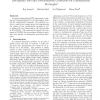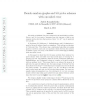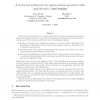9 search results - page 1 / 2 » Pseudorandom Generators for Combinatorial Checkerboards |
ECCC
2010
13 years 5 months ago
2010
We define a combinatorial checkerboard to be a function f : {1, . . . , m}d {1, -1} of the form f(u1, . . . , ud) = d i=1 fi(ui) for some functions fi : {1, . . . , m} {1, -1}. T...
FOCS
1996
IEEE
13 years 9 months ago
1996
IEEE
A common subproblem of DNF approximate counting and derandomizing RL is the discrepancy problem for combinatorial rectangles. We explicitly construct a poly(n)-size sample space t...
CORR
2011
Springer
12 years 8 months ago
2011
Springer
We study probabilistic bit-probe schemes for the membership problem. Given a set A of at most n elements from the universe of size m we organize such a structure that queries of t...
CCS
2005
ACM
13 years 10 months ago
2005
ACM
We present a formal model and a simple architecture for robust pseudorandom generation that ensures resilience in the face of an observer with partial knowledge/control of the gen...
CSR
2011
Springer
12 years 8 months ago
2011
Springer
Abstract. Many theorems about Kolmogorov complexity rely on existence of combinatorial objects with specific properties. Usually the probabilistic method gives such objects with b...



